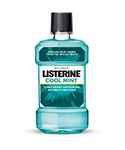What is Halitosis?
Understanding halitosis and how it’s caused, can keep you out of embarrassing circumstances. But what if you don’t know the symptoms of halitosis?
Why You Should Care if You Have Halitosis
Halitosis is a common complaint. If your halitosis isn’t caused by what you eat, it could be a sign of oral disease or even serious medical conditions. Numerous health problems cite bad breath as a side-effect, which shows that smelly breath isn’t a situation that’s isolated to just your mouth.
Not all causes of unpleasant breath mean that you’re ill. But you won’t know whether you’re healthy or not until you speak with your dentist. Some cases, like morning breath, occur when you wake up and might resolved by brushing your teeth and using LISTERINE® mouth rinse or antiseptic gargle.
Common Causes of Halitosis
An imbalance of certain types of oral bacteria can cause halitosis. This is especially true when bad breath is caused by gum disease.
In most situations, the bacteria causing the smell are located along the surface of your tongue. Or, they’re nestled under your gum lines around each tooth.
Deep gum pockets resulting from periodontal disease are a result of oral bacteria causing infection. When this happens, the gums detach and create a deeper pocket. Side effects like receding gumlines, bone loss, halitosis, and tooth mobility may also occur.
When bacteria accumulate as dental plaque , you will start to notice a thick film along your gums. If not removed, it will begin to calcify. Gradually, soft plaque turns into a cement-like tartar (called calculus) which will require professional dental treatment.
How to Tell When Your Halitosis is Severe
Lick the back of your hand. Wait for the saliva to dry and then smell it. If it stinks, your breath does as well.
Do your friends or colleagues back away from you during conversations? Perhaps they stand at a greater distance than they do when talking to other people? It could be because of your breath.
Are other people constantly offering you breath mints or suggesting you try mouthwash? They may be trying to gently let you know about your condition.
Although it seems embarrassing, the easiest way to find out if your bad breath is halitosis is to ask your dentist. They can help support you if it’s a problem (or reassure you when it isn’t.)
Treatment for Halitosis
In most cases, it starts with re-vamping your oral hygiene routine. A three step daily routine of brushing, flossing and rinsing with LISTERINE ® mouthwash can help prevent common oral problems likes gum problems and cavities that cause smelly breath.
Select dental care products designed for bad breath, such as an antiseptic gargle or oral rinse as these are formulated to help manage symptoms more effectively.
When a mouth wash (or alcohol-free mouth wash) is not making any improvement, professional dental cleaning is usually the best treatment. Your dentist or hygienist will use special tools to clean away bacteria. Consequently, symptoms of halitosis can also improve!
Know When to See a Dentist
If you have great oral health habits and have already tried a variety of dental products like mouth wash to treat bad breath, but symptoms don’t improve it’s time to see your dentist.


